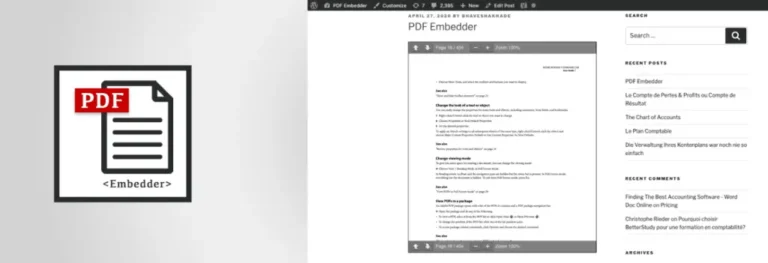Are you a developer looking to enhance the performance of your PHP and WordPress queries?
We will explore the importance of optimization and delve into the basics of PHP and WordPress queries. We will discuss common performance issues, optimizing PHP configuration, advanced steps for WordPress query optimization, and techniques for enhancing WP_Query in WordPress.
Learn about repairing and removing database bloat, using plugins for database optimization, and finalizing performance optimization with best practices and maintenance tips. Join us on this journey to streamline your development process!
Key Takeaways:
Understanding PHP and WordPress Query Optimization
Understanding PHP and WordPress Query Optimization is crucial for enhancing the performance and efficiency of your website.
PHP and WordPress query optimization involve various techniques to streamline the database queries, reduce server load, and improve overall website speed. One effective method is to minimize the number of queries executed by optimizing existing code, using efficient data retrieval methods, and caching frequently accessed data.
Implementing indexing on database tables and utilizing efficient query structures can vastly improve query performance. It is important to regularly monitor and analyze query execution times using tools like Query Monitor or built-in WordPress debugging tools to identify and address bottlenecks.
Importance of Optimization for Developers
Optimization plays a key role for developers in ensuring the performance and efficiency of their applications.
By optimizing code, developers can streamline their applications, improve loading times, and enhance overall user experience.
Efficient algorithms and well-structured code not only reduce resource consumption but also pave the way for scalability and future enhancements. Optimized applications are more likely to rank higher in search engine results, attracting a larger user base.
Developer commitment to optimization not only reflects their dedication to craftsmanship but also directly impacts the success and competitiveness of their projects.
Basics of PHP and WordPress Queries
Mastering the basics of PHP and WordPress queries is essential for building efficient and responsive websites.
PHP, a server-side scripting language, allows developers to create dynamic web pages by embedding PHP code within HTML. WordPress, a popular content management system, uses PHP to interact with a database and generate web content.
Queries in both PHP and WordPress play a vital role in retrieving, updating, and manipulating data from databases. These queries are written using SQL (Structured Query Language) to fetch specific information needed for displaying content on websites.
Overview and Functionality
An in-depth understanding of the overview and functionality of PHP and WordPress queries is fundamental for optimizing website performance.
PHP and WordPress queries play a crucial role in interacting with databases, retrieving data, and generating dynamic content on websites. When a user requests information on a website, the server uses PHP and WordPress queries to fetch the relevant data from the database, process it, and display the results. These queries are written in structured languages such as SQL, providing a standardized way to communicate with databases efficiently.
Optimizing PHP and WordPress queries involves writing efficient code, avoiding unnecessary calls to the database, and properly indexing database tables to enhance query performance. By optimizing queries, website loading times can be significantly improved, resulting in a better user experience and higher search engine rankings.
Common Performance Issues
Identifying and resolving common performance issues is essential for maintaining an efficient and responsive website.
One common performance issue developers often face is slow page loading times, which can frustrate users and lead to decreased engagement. By utilizing tools like Google PageSpeed Insights or Lighthouse, developers can pinpoint areas of improvement, such as optimizing images, leveraging browser caching, and reducing server response times.
Debugging tools like Chrome DevTools can help track down issues related to inefficient JavaScript or CSS code, enabling developers to make necessary adjustments efficiently. Keeping an eye on metrics like time to first byte, time to interactive, and overall page size can further aid in early detection and resolution of performance bottlenecks.
Identifying and Resolving Slow Queries
Efficiently identifying and resolving slow queries is a key aspect of optimizing website performance.
To effectively tackle slow queries, one important strategy is to analyze the database schema and index design. Ensuring that indexes are properly set up and that queries are utilizing them optimally can significantly boost performance. Monitoring query execution times and resource consumption can provide valuable insights into bottlenecks.
Another crucial technique is query optimization, which involves rewriting queries to be more efficient and making use of query optimization tools such as query analyzers. By fine-tuning the queries, unnecessary processing steps can be eliminated, leading to faster execution.
Optimizing PHP Configuration
Optimizing PHP configuration settings can significantly enhance the performance and efficiency of your web applications.
Choosing the appropriate PHP version for your application is crucial. Each version comes with improvements and changes that can directly impact your application’s performance. Ensuring that the php.ini file is configured correctly is another key aspect. Customizing settings such as memory_limit, max_execution_time, and error_reporting can address specific needs of your application, optimizing its performance. Performance tuning involves fine-tuning these settings based on the requirements of your application, server resources, and traffic levels to achieve the best possible results.
Version Selection and Configuration Settings
Choosing the right PHP version and configuring settings optimally are crucial steps in improving website performance.
When deciding on a PHP version, consider the compatibility with your website’s existing codebase, as newer versions might offer better features but could also require adjustments in the code. It’s important to stay updated with the latest releases to benefit from security patches and bug fixes.
Once a PHP version is selected, fine-tuning the configuration settings is vital. Tweaking parameters related to memory_limit, max_execution_time, and error_reporting can significantly impact the performance of PHP scripts on your website.
Advanced Steps for WordPress Query Optimization
Implementing advanced techniques for WordPress query optimization can further boost the speed and efficiency of your website.
One of the key strategies in optimizing WordPress queries involves using caching. By storing frequently accessed data in a cache, you can reduce the need to retrieve the same information repeatedly from the database, thereby improving the overall performance of your site. Additionally, database indexing plays a crucial role in query optimization by enabling faster data retrieval. By indexing specific columns in your database tables, you can speed up query execution and enhance the efficiency of your WordPress site.
Hosting, Plugin Management, and File Optimization
Effective management of hosting, plugins, and files is crucial for maximizing WordPress query optimization.
In terms of hosting, selecting a reliable and secure provider is paramount. Speed, uptime, and scalability are key factors that can significantly impact the performance of your website. Ensuring that your hosting provider offers adequate resources and support for your WordPress site is essential.
Optimizing plugins involves careful selection, regular updates, and decluttering unnecessary ones. Too many active plugins can slow down your site, so evaluating and optimizing their usage is vital for maintaining optimal performance.
File management, including proper organization, compression, and minification, plays a critical role in enhancing loading speeds. Tools like WP-Optimize, Smush, and WP Rocket can help streamline this process, leading to improved site performance and user experience.
Optimizing WP_Query in WordPress
Fine-tuning WP_Query in WordPress can significantly improve database performance and query efficiency.
One essential aspect of optimizing WP_Query is query customization. By specifying the exact parameters needed for a specific query, unnecessary data retrieval can be avoided, reducing server load and enhancing response times.
Along with customization, utilizing caching mechanisms can further enhance performance. Implementing a caching system such as transient caching or object caching can store query results temporarily, reducing the need to execute frequent queries and speeding up page loading.
Performance tweaks, such as limiting the number of queries, utilizing indexes efficiently, and optimizing database structure, play a crucial role in WP_Query optimization. By following best practices and monitoring query performance, WordPress websites can achieve faster loading times and improved overall user experience.
Enhancing Query Performance
Enhancing query performance through efficient optimization techniques is key to achieving a responsive and fast-loading WordPress website.
Indexing plays a crucial role in optimizing queries. Ensuring that your database tables are properly indexed can significantly improve search speeds.
Another effective method is caching. Implementing a caching solution like a plugin can store query results and serve them directly to users without recalculating each time, reducing server load and enhancing speed.
Query refinement techniques involve optimizing database queries by minimizing unnecessary data retrieval and using efficient query structures.
- Use plugins like WP-Optimize to clean up and optimize your database regularly.
- Consider using a content delivery network (CDN) to distribute query load geographically.
- Employ lazy loading for images to reduce initial load times.
Repairing and Removing Database Bloat
Addressing database bloat issues is essential for maintaining database efficiency and overall website performance.
Database bloat can significantly impact the speed and responsiveness of your website, causing delays in data retrieval and storage. When the database accumulates unnecessary data and unused space, the system may slow down, affecting user experience and efficiency. To combat this, regular monitoring and maintenance of the database are crucial. Implementing strategies such as
- database cleanup scripts
- vacuuming
- reindexing
can help in repairing and removing bloat. These methods optimize database performance and ensure smooth operations, enhancing overall system functionality.
Cleaning Up and Deactivating Bloat-Inducing Elements
Cleaning up and deactivating bloat-inducing elements can streamline database operations and enhance overall website efficiency.
One important aspect of efficient database maintenance lies in managing plugins effectively. Regularly auditing and removing unnecessary plugins not only reduces bloat but also decreases the risk of security vulnerabilities.
Performing routine data cleanup tasks such as deleting unused tables, optimizing queries, and repairing corrupted data can significantly improve database performance.
Utilizing optimization techniques like indexing, caching, and query optimization further contribute to a more responsive and efficient database system.
These steps collectively help in maintaining a healthy database environment and ensuring optimal website performance.
Using Plugins for Database Optimization
Leveraging plugins for database optimization can automate maintenance tasks and streamline performance enhancements in WordPress.
One of the key advantages of using plugins is the ability to easily select from a wide range of options that cater to specific database optimization needs. These plugins often come equipped with configurable settings that allow for personalized customization based on the unique requirements of the website. By utilizing these configuration options, users can fine-tune parameters such as cache expiration, query optimization, and index tuning to achieve optimal database performance.
Selection and Configuration
Careful selection and optimal configuration of database optimization plugins are crucial for achieving peak performance in WordPress.
When choosing a database optimization plugin for WordPress, consider factors such as the plugin’s compatibility with your current setup, the frequency of updates, and the support provided by the plugin developer.
Look for plugins that offer features like automatic optimization, query caching, and database cleanup tools to streamline performance. It’s also essential to fine-tune the plugin settings according to your website’s specific requirements, monitoring the impact on database queries and overall speed.
By leveraging these best practices, you can unlock the full potential of your database optimization efforts and enhance the user experience of your WordPress site.
Finalizing Performance Optimization
Finalizing performance optimization measures ensures that your WordPress site operates at its peak efficiency and responsiveness.
Performance optimization is a critical aspect of website management to enhance user experience and boost search engine rankings. By implementing testing methodologies, you can pinpoint areas of improvement and track progress over time.
Through continuous monitoring of site performance metrics like load speed and uptime, you can swiftly address any issues that may arise. Ongoing maintenance practices such as updating plugins and optimizing code contribute to the long-term success of your WordPress site.
Incorporating these strategies into your workflow establishes a foundation for sustainable online growth.
Best Practices and Maintenance
Adhering to best practices and consistent maintenance routines is essential for sustaining optimal performance levels in WordPress.
One of the key optimization techniques for improving WordPress performance is optimizing images to reduce file sizes without compromising quality. In addition, leveraging caching plugins, utilizing a content delivery network (CDN), and minifying CSS and JavaScript files can significantly boost site speed.
Regular monitoring using tools like New Relic, GTmetrix, or Google PageSpeed Insights can help identify performance bottlenecks and areas for improvement. It is also crucial to maintain the latest WordPress version and plugin updates, as outdated software can lead to security vulnerabilities and performance issues.
Frequently Asked Questions
What is PHP and WordPress Query Optimization for Developers?
PHP and WordPress Query Optimization for Developers involves the process of identifying and improving the performance of queries in PHP and WordPress based websites. This is important for developers as it ensures that the website loads faster and functions efficiently, providing a better user experience.
Why is Query Optimization important for PHP and WordPress Developers?
Query Optimization is important for PHP and WordPress Developers as it directly affects the speed and performance of the website. With optimized queries, the website can handle a larger amount of traffic, resulting in a better user experience and potentially higher conversions.
What are some common techniques used for PHP and WordPress Query Optimization?
Some common techniques used for PHP and WordPress Query Optimization include indexing, using cached queries, minimizing the use of wildcard searches, and avoiding unnecessary joins in SQL queries. These techniques can help improve the performance of the website and reduce server load.
How can developers identify performance issues with queries in PHP and WordPress?
Developers can use tools such as query monitors or performance profiling plugins to identify performance issues with queries in PHP and WordPress. These tools provide insights into the number of queries, their execution time, and any errors encountered, allowing developers to pinpoint and resolve any issues.
Are there any best practices for PHP and WordPress Query Optimization?
Yes, some best practices for PHP and WordPress Query Optimization include using proper data types, avoiding unnecessary queries, and using efficient joins. It is also important for developers to regularly monitor and optimize their queries to ensure optimal website performance.
Can Query Optimization have a negative impact on website performance?
Yes, if not done correctly, Query Optimization can have a negative impact on website performance. This can happen if the wrong queries are optimized or if the optimization process is not done carefully. It is important for developers to test and monitor the impact of their changes to ensure they do not negatively affect website performance.



![How to Upload a PDF to WordPress [A Complete Visual Guide]](https://codingheros.com/wp-content/uploads/2024/07/how-to-upload-a-pdf-to-wordpress-a-complete-visual-guide-768x336.png)
